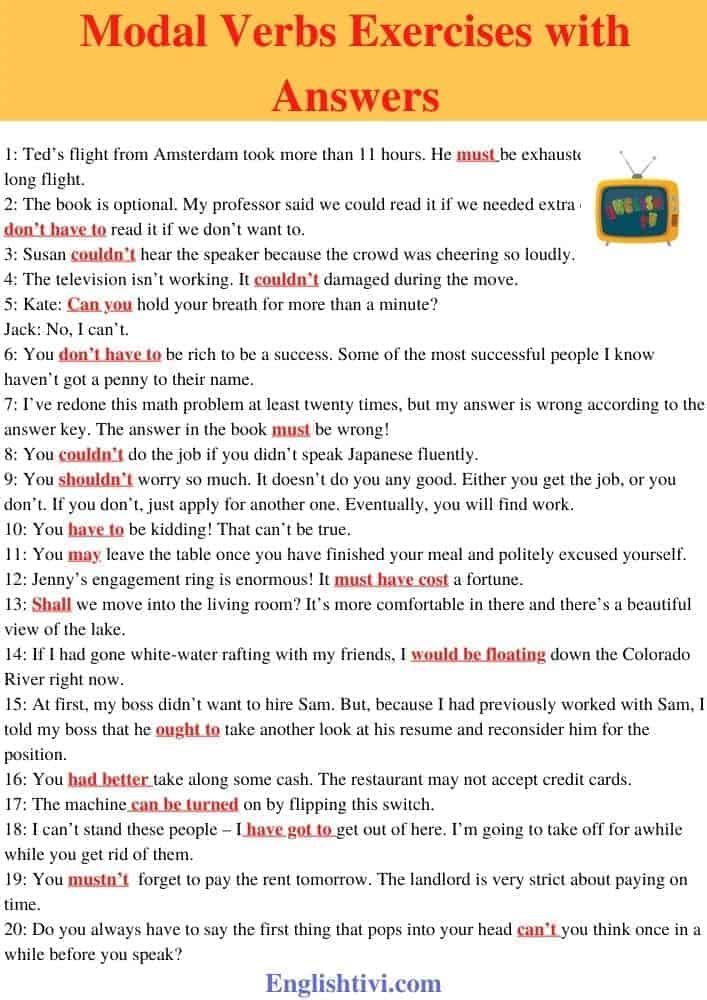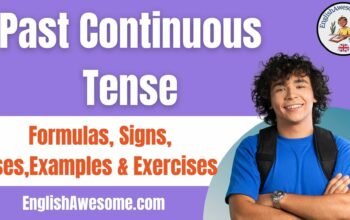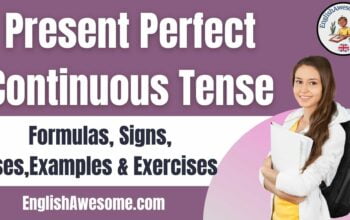Modal verbs are a group of verbs that are very familiar to all English learners. Right from the 6th grade, we acquainted with them through simple sentences such as “Can I help you?”, “I can swim”. Please review the usage of modal verbs in English.
⏩ Sign Up to Get Bonus
Let’s learn about it with English tivi right now.
You might also like: ALL the English Grammar Basics You Need
Characteristics of Modal Verbs
Structure of Modal Verbs :
S + Modal Verbs + V (bare-infinitive)
– They can speak French and English.
Do not change the form in the throne.
– He can use our phone. (He cans use your phone)
Exists in the Present and the Simple Past
– She can cook meals.
– She could cook meals when she was twelve.

Can – Could
Can
Can have only 2 tenses: Present and Simple Past. In other forms, we use the equivalent verb “be able to”. Can also be used as an auxiliary verb to form certain expressions.
Can and Could mean “can”, expressing a possibility (ability)
– Can you swim?
– She could ride a bicycle when she was five years old.
In everyday speech, Can is used instead of May to express permission, and the negative Cannot is used to express a prohibition.
– In London buses, you can smoke on the upper deck, but you can’t smoke downstairs.
Can also express a possibility. In questions and exclamations, Can means ‘Is it possible…?’
– Can it be true?
– It surely can’t be four o’clock already!
Can not is used to express a virtual impossibility.
– He can’t have missed the way. I explained the route carefully.
When used with the verb of perception, Can give the same meaning as the Continuous Tense.
– Listen! I think I can hear the sound of the sea.
Could
Could is the simple past tense of Can.
– She could swim when she was five.
Could is also be used in conditional sentences.
– If you tried, you bthat work.
In informal terms, Could is seen as more polite than Can.
– Can you change a 20-dollar note for me, please?
– Could you tell me the right time, please?
Could is used to express a mild distrust or protest.
– His story could be true, but I hardly think it is.
– I could do the job today, but I’d rather put it off until tomorrow.
Could – Was/Were able to
- If the action describes an ability, a knowledge, Could is used more often than Was/Were able to.
– Huy hurt his foot, and he couldn’t play in the match.
– The window was locked, and I couldn’t open it.
- If the statement implies success in doing (succeeded in doing), then Was/Were able to be used, not Could.
– I finished my work early and so was able to go to the pub with my friends.
May – Might
May and the past form Might express permission.
– May I take this book? – Yes, you may.
– She asked if she might go to the party.
May/Might is used to describing a possibility that may or may not happen.
– It may rain.
– He admitted that the news might be true.
Used in exclamation sentences, May/Might expresses a wish (In this usage, May can be seen as a kind of Subjunctive)
– May all your dreams come true
May/Might is used in clauses following the verbs hope and trust.
– I trust (hope) that you may find this plan to your satisfaction.
– He trusted (hoped) that we might find the plan to our satisfaction.
May/Might is used instead of an adverb clause of concession.
– He may be poor, but he is honest. (Though he is poor…)
– Try as he may, he will not pass the examination. (Though he tries hard…)
– Try as he might, he could not pass the examination. (Though he tried hard…)
May/Might is often used in adverb clauses of purpose. In this case, people often use Can/Could instead of May/Might.
– She was studying so that she might read English books.
Might (not May) is sometimes used in sentences to express a petulant reproach.
– You might listen when I am talking to you.
– You might try to be a little more helpful.
Must
Must means “must” express order or a compulsion.
– You must drive on the left in London.
Must is used in logical reasoning sentences.
– Are you going home at midnight? You must be mad!
– You have worked hard all day; you must be tired.
Must Not (Mustn't) describes a restraining order.
– You mustn’t walk on the grass
When we want to express the negative form of Must with the meaning “unnecessary”, people use Need Not (Needn't).
– Must I do it now? – No, you needn’t. Tomorrow will be soon enough.
Must and Have To
Have To is used instead of Must in forms that Must do not have.
– We shall have to hurry if we are going to catch the twelve o’clock train
Have To cannot replace Must in logical reasoning.
– He must be mad. (I personally thought that he was mad.)
Must and Have To – can both be used to express compulsion. However, Must means compulsion coming from the speaker while Have To means compulsion coming from external circumstances.
– Passengers must cross the line by the bridge
– Passengers have to cross the line by the bridge.
Shall – Should
Shall
Used in the Simple structure Future in the first person.
– I shall do what I like.
Express a promise (promise), a determination (determination), or a threat (threat).
– If you work hard, you shall have a holiday on Saturday. (Promise)
– He shall suffer for this; he shall pay you what he owes you. (Thread)
– These people want to buy my house, but they shan’t have it. (Determination)
Should
Used in sentences telling someone what to do, and is equivalent to ought to.
– You should do what the teacher tells you.
– People who live in glass houses should not throw stones. (Proverb)
Use instead of Must when you don't want to express a meaning that forces someone to do something.
– Members who want tickets for the dance should apply before September 1st to the Secretary
Will – Would
Will
Used in the simple future, to express a plan, a willingness, a promise, or a determination.
– All right; I will pay you at the rate you ask. (Willingness)
– I won’t forget little Margaret’s birthday. I will send her a present. (Promise)
Use in a suggestion.
– Will you shut the door?
– Shall I open the window?
Would
Used to form the future in the past or tenses in conditional sentences.
– He said he would send it to me, but he didn’t.
– If she were here, she would help us.
– He would have been very happy if he had known about it.
Describe a past habit. In this sense, WOULD can be used instead of Used to.
– Every day he would get up at six o’clock and light the fire
Oought To – Dare – Need
Ought To
Ought to means “should”, akin to SHOULD. In most cases, Ought to can be replaced with Should.
– They ought to (should) pay the money.
– He ought to (should) be ashamed of himself.
Ought to is also used to express a strong probability.
– If Alice left home at 9:00, she ought to be here any minute now.
Ought to can be used in the future with words that determine future time like tomorrow, next Tuesday…
– Our team ought to win the match tomorrow
Ought Not to Have+ past participle expresses a disagreement about an action done in the past.
– You ought not to have spent all that money on such a thing.
Dare
Dare means “dare, dare” can be seen as a modal verb as well as a regular verb. As a modal verb, it has all the properties of this verb.
– Dare he go and speak to her?
– You daren’t climb that tree, dare you?
– He doesn’t dare to answer my letter.
– She didn’t dare to say a word, did she?
The expression “I dare say” means “maybe, perhaps” is synonymous with the words “perhaps”, “it is probable”. This idiom is usually not used with any subject other than the first person
– He is not here yet, but I dare say he will come later.
Need
There are two forms of Need verbs: one is a regular verb and the other is a modal verb. As a modal verb, Need has only the Present form and has all the properties of a modal verb. It means “must”, similar to Have To. Therefore, Needn't is also considered a kind of negation of Must.
– Need he work so hard?
– You needn’t go yet, need you?
One thing to remember is that the modal verb Need is not used in the definite form. It is used only in negative and interrogative forms. When used in the definite it must be used with a word that has a negative meaning.
– You needn’t see him, but I must.
– I hardly need to say how much I enjoyed the holiday.
Used To
Used To is a special verb form. It can be seen as a regular verb or a modal verb in forming the negative and the interrogative.
– You used to live in London, usedn’t you?
– He usedn’t to smoke as much as he does now.
– He didn’t use to smoke as much as he does now.
– Did you use to climb the old tree in the garden?
Nowadays people tend to use did and didn't for negative and interrogative for Used To. In many cases, the negative can be formed using never. The usage of usedn't to is very rare because the spelling is confusing and difficult to read
– You never used to make that mistake.
Used To refers to a continuous, prolonged, repeated action in the past that no longer exists.
– People used to think that the earth was flat.
With the Past Simple one knows only the action that happened. With Used To one can see the lengthening nature of that action.
– He was my classmate. (Unknown for how long)
– He used to be my classmate (For quite a while)
Distinguish Used To and some other forms
- Used To + infinitive: continuous action in the past
- Get Used To + V-ing: get used to something.
- Be Used To + V-ing: get used to something
– It took my brother two weeks to get used to working at night. Now he’s used to it.
– He used to work six days a week. (Now he doesn’t)
You might also like: Verb forms: V-ing and to V
Modal Verbs Exercises
1: Ted’s flight from Amsterdam took more than 11 hours. He ……………….. be exhausted after such a long flight.
A. had better
B. can
C. must
2: The book is optional. My professor said we could read it if we needed extra credit. But we ………………..read it if we don’t want to.
A. don’t have to
B. can not
C. must not
3: Susan………………..hear the speaker because the crowd was cheering so loudly.
A. can’t
B. couldn’t
C. might not
4: The television isn’t working. It ………………..damaged during the move.
A. must
B. must be
C. must have been
5: Kate: ………………..hold your breath for more than a minute?
Jack: No, I can’t.
A. Can you
B. Are you able to
C. Might you
6: You ………………..be rich to be a success. Some of the most successful people I know haven’t got a penny to their name.
A. can’t
B. shouldn’t
C. don’t have to
7: I’ve redone this math problem at least twenty times, but my answer is wrong according to the answer key. The answer in the book………………..be wrong!
A. must
B. should
C. have to
8: You ………………..do the job if you didn’t speak Japanese fluently.
A. can’t
B. won’t be able to
C. couldn’t
9: You ………………..worry so much. It doesn’t do you any good. Either you get the job, or you don’t. If you don’t, just apply for another one. Eventually, you will find work.
A. don’t have to
B. shouldn’t
C. can’t
10: You ………………..be kidding! That can’t be true.
A. should
B. ought to
C. have to
11: You ………………..leave the table once you have finished your meal and politely excused yourself.
A. might
B. may
C. would
12: Jenny’s engagement ring is enormous! It……………….. a fortune.
A. must be costing
B. must cost
C. must have cost
13: ………………..we move into the living room? It’s more comfortable in there and there’s a beautiful view of the lake.
A. Shall
B. Will
C. Must
14: If I had gone white-water rafting with my friends, I ………………..down the Colorado River right now.
A. would float
B. would be floating
C. would have float
15: At first, my boss didn’t want to hire Sam. But, because I had previously worked with Sam, I told my boss that he ………………..take another look at his resume and reconsider him for the position.
A. must
B. has to
C. ought to
16: You……………….. take along some cash. The restaurant may not accept credit cards.
A. can
B. had better
C. has to
17: The machine ………………..on by flipping this switch.
A. could be turning
B. may turn
C. can be turned
18: I can’t stand these people – I ………………..get out of here. I’m going to take off for awhile while you get rid of them.
A. had better
B. might
C. have got to
19: You……………….. forget to pay the rent tomorrow. The landlord is very strict about paying on time.
A. couldn’t
B. mustn’t
C. don’t have to
20: Do you always have to say the first thing that pops into your head.
………………..you think once in a while before you speak?
A. Don’t can
B. Can’t
C. Cannot
Read more: English Grammar
Modal Verbs Exercises with Answers
1: C. must
2: A. don’t have to
3: B. couldn’t
4: C. must have been
5: A. Can you
6: C. don’t have to
7: A. must
8: C. couldn’t
9: B. shouldn’t
10: C. have to
11: B. may
12: C. must have cost
13: A. Shall
14: B. would be floating
15: C. ought to
16: B. had better
17: C. can be turned
18: C. have got to
19: B. mustn’t
20: B. can’t

Modal Verbs Exercises with Answers Pdf
Conclusion
Above is the entire content of knowledge as well as some exercises on modal verbs in English. English tivi hopes that through the article, you have gained useful knowledge as well as motivation to conquer English every day. Do not forget to update the next share of English TV. Good luck!
Subscribe to the English TV channel on Youtube to improve your English skills!





